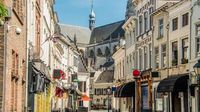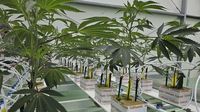The Netherlands is making significant strides in its cannabis policy by expanding a government-run initiative that permits licensed producers to supply marijuana to the country’s well-known coffee shops. The latest development allows ten municipalities to sell cannabis sourced from ten licensed cultivators, marking a historic shift in the nation’s approach to cannabis regulation.
According to the Associated Press, this expansion of the so-called "wietexperiment" aims to provide a legal and regulated supply chain for cannabis, a move that advocates believe will help eliminate a long-standing legal anomaly where the sale of cannabis was tolerated, but its production remained illegal. Before this expansion, approximately 80 coffee shops across ten Dutch cities could only obtain cannabis from three licensed suppliers.
Among the licensed cultivators participating in this program is Village Farms International, which operates offices in Vancouver, British Columbia, and Lake Mary, Florida. The pilot program, which began in December 2023 in the cities of Breda and Tilburg, initially allowed about 19 participating coffee shops to offer both legally grown cannabis and unregulated products. As of April 7, 2025, all coffee shops enrolled in the program must sell only regulated and tracked cannabis, as mandated by the government.
Rick Bakker, the commercial director at Hollandse Hoogtes, one of the regulated producers, emphasized the importance of this change. “Weed was sold here legally for 50 years, but the production was never legal. So it’s finally time to end that crazy, unexplainable situation and make it a legal professional sector,” he stated. This sentiment reflects a broader push for legalizing cannabis production, which has faced resistance in the past.
Hollandse Hoogtes, located in Bemmel near the German border, is one of the largest producers in the experiment, producing around 200 kilograms (440 pounds) of weed weekly. The company has adopted high-quality control measures to ensure the safety and purity of the cannabis it produces. Benjamin Selma, the head grower at Hollandse Hoogtes, shared insights on their quality control processes, stating, “We do a full test, microbial, cannabinoid, terpene, as well as yeast and anaerobic bacteria, heavy metals as well. So it’s very, very controlled.”
In addition to rigorous testing, the production facility is environmentally conscious, utilizing solar panels for energy and biodegradable packaging. This focus on sustainability is part of a broader commitment to responsible cannabis production.
Despite the progress being made, the Netherlands has seen a shift in its cannabis culture over the years. Amsterdam, once a haven for marijuana enthusiasts, has been closing coffee shops and implementing bans on smoking weed in certain historic areas. This conservative trend raises questions about the future of cannabis culture in the country.
The experiment is not just about cannabis; it serves as a test of cooperation among various stakeholders, including legal growers, coffee shop owners, and local authorities. Breda Mayor Paul Depla remarked, “It is also a great opportunity to see how cooperation within the closed chain between legal growers, coffeeshop owners and all other authorities involved works.”
As this initiative unfolds, the government plans to evaluate the experiment after four years to assess its impact on crime, safety, and public health. A research team, guided by an independent evaluation committee, will analyze the effects of a controlled cannabis supply chain, aiming to provide valuable insights into the benefits and challenges of such a system.
The coffee shops participating in this initiative are spread across various municipalities, including Almere, Arnhem, Breda, Groningen, Heerlen, Hellevoetsluis, Maastricht, Nijmegen, Tilburg, and Zaanstad. Each location presents a unique opportunity to observe the dynamics of legal cannabis sales in a regulated environment.
Advocates for cannabis legalization have long argued that regulating production would improve safety for consumers while reducing crime associated with the illegal cannabis trade. Derrick Bergman, chairman of the Union for the Abolition of Cannabis Prohibition, described the initiative as “really a political compromise.” The plan traces back to 2017 when discussions began among Christian political parties and pro-legalization factions following the failure of a bill to decriminalize cannabis production.
While the Netherlands has been a trailblazer in decriminalizing cannabis since the 1970s, this latest initiative represents a significant evolution in its cannabis policy. As the country continues to navigate the complexities of cannabis regulation, the outcomes of this experiment could have far-reaching implications for future legislation and the overall cannabis landscape in Europe.
In conclusion, the expansion of the cannabis supply initiative in the Netherlands marks a pivotal moment in the country’s approach to cannabis regulation. By allowing licensed producers to supply coffee shops with legally cultivated cannabis, the government aims to create a safer, more regulated environment for consumers while addressing the challenges posed by illegal production. As the experiment unfolds, all eyes will be on the Netherlands to see how this bold move shapes the future of cannabis in Europe.





